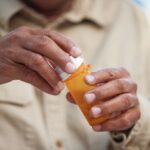The co-occurring disorder of post-traumatic stress disorder (PTSD) and substance use disorder (SUD) is a complex and challenging issue that many individuals face. Understanding the connection between these two conditions is crucial in order to provide effective treatment and support for individuals who are struggling.
Understanding Co-occurring Disorders
A co-occurring disorder is when an individual simultaneously experiences a mental health issue alongside a substance use disorder. This term encompasses a broad spectrum of possible mental health and substance abuse combinations. When the co-occurring disorders are post-traumatic stress disorder and substance addiction, the result is a debilitating interaction. PTSD, a condition that can develop following a traumatic event, involves symptoms such as intense anxiety, flashbacks, and intrusive thoughts. When coupled with addiction, where an individual becomes physically or psychologically dependent on substances like drugs or alcohol, the situation becomes particularly complex.
The Link Between Post-traumatic Stress Disorder and Substance Addiction
Individuals grappling with PTSD often find themselves in a relentless search for relief. The intense emotional turmoil, characterized by ongoing fear, anxiety, and an overwhelming sense of helplessness, propels a desperate attempt to escape these feelings. While drugs and alcohol may offer temporary relief, long-term substance use will exacerbate the symptoms of PTSD, leading to increased anxiety, depression, and isolation.
This intensification of symptoms fuels the cycle of addiction, as the individual becomes more reliant on substances to cope with the heightened distress. In addition, trauma can alter brain chemistry in ways that heighten susceptibility to substance use disorders, just as addiction can modify the brain’s response to stress, making it more difficult to process and recover from trauma.
Identifying Symptoms of Co-occurring PTSD and Addiction
Individuals battling both PTSD and SUD might experience a complex array of symptoms. Key symptoms include persistent flashbacks to traumatic events that intrude on daily life, causing severe distress. Nightmares and sleep disturbances can worsen with substance use. Mood swings can also intensify.
Social isolation becomes a coping strategy for many, as they withdraw from friends, family, and activities they once enjoyed, partly due to feelings of shame or guilt associated with their addiction, and partly due to a desire to avoid triggers that may reignite traumatic memories.
Additionally, heightened anxiety, depression, and an increased sense of alertness or feeling on edge can signal the presence of co-occurring PTSD and SUD. The symptoms present a significant barrier to daily functioning and quality of life.
The Prevalence of Co-occurring Post-traumatic Stress Disorder and Substance
The National Center for PTSD, part of the United States Department of Veterans Affairs, published the results of a national study that showed 44.6 percent of the general population in the United States diagnosed with lifetime PTSD also suffered from drug or alcohol addiction. The study also showed if an individual had been diagnosed with PTSD at any time in their life, they had an increased chance of receiving a diagnosis of a substance use disorder. The study also shows Veterans diagnosed with lifetime PTSD were twice as likely to suffer from alcohol use disorder (AUD) and three times more likely to meet the criteria for drug addiction.
English Mountain Recovery Center Can Help
Located in Tennessee’s eastern Smoky Mountains, English Mountain Recovery Center understands the complexities of the co-occurring disorders of post-traumatic stress disorder and drug or alcohol addiction. We understand that receiving the correct treatment is essential for recovery. If you or someone close to you is struggling with a dual diagnosis, our skilled professionals can help. We provide gender-specific programs rooted in a 12-step framework, encompassing group and individual therapy, psychoeducation, holistic therapies, and strategies for preventing relapse. It is time to get the help you need. Contact us today.



